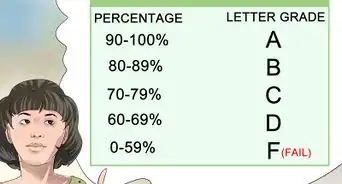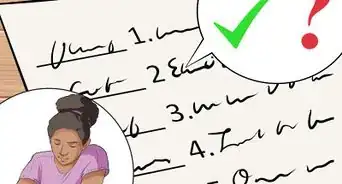This article was co-authored by Alexander Ruiz, M.Ed. and by wikiHow staff writer, Amber Crain. Alexander Ruiz is an Educational Consultant and the Educational Director of Link Educational Institute, a tutoring business based in Claremont, California that provides customizable educational plans, subject and test prep tutoring, and college application consulting. With over a decade and a half of experience in the education industry, Alexander coaches students to increase their self-awareness and emotional intelligence while achieving skills and the goal of achieving skills and higher education. He holds a BA in Psychology from Florida International University and an MA in Education from Georgia Southern University.
There are 9 references cited in this article, which can be found at the bottom of the page.
wikiHow marks an article as reader-approved once it receives enough positive feedback. This article received 15 testimonials and 82% of readers who voted found it helpful, earning it our reader-approved status.
This article has been viewed 277,077 times.
If you want to ace your next test, create a study schedule for yourself and spend at least 30 minutes each day reviewing your materials and going over flashcards. On the day of the test, review the material once more, and try to stay calm once the test begins. Answer the easiest questions first and go back to the harder questions so that you don’t waste any time. Don’t forget to go over your completed test thoroughly before you hand it in to catch any missed answers or mistakes!
Steps
Studying for the Test
-
1Pay attention and take good notes in class. Participate during the lesson and make sure that you understand the material. Take good notes so you can refer back to them when you are studying and do all of your assigned homework. If there’s something in the lesson that you don’t understand, ask your teacher about it![1]
-
2Start studying the first day you get assigned work. Ideally, you should start studying as your class works through the material rather than planning a few study sessions right before a big test. For example, you can review your notes immediately after class or before you do your homework each evening.[4]
- Check out the planned exam date on the syllabus and start studying as soon as possible. Give yourself at least a couple of weeks to prepare.
Advertisement -
3Spend at least 30 minutes studying each day. To retain the most information, it’s best to study for at least 20-30 minutes every day in the weeks leading up to the test. Set aside a 30-minute block of time every day to review your notes, go over your flash cards, read new chapters, and work on practice tests.[5]
- Short bursts of intense studying are more effective than super long study sessions. Try to avoid going over 45 minutes without taking a break.
- Try rewriting your class notes each day to commit them to memory.
-
4Ask your teacher for study materials and information about the test. Have your teacher confirm which chapters will be covered on the test, what the major topics are, and what format the test will be in. You should also ask if there are any study guides or practice tests that you can use to prepare for the test. Teachers want you to do well and they will happily provide this information![6]
- For example, ask your teacher if the test will have multiple-choice, short answer, or essay questions so that you know what to expect.
- Attend any review sessions that your teacher provides.
- Find out if there are any extra credit assignments that you can do.
-
5Create your own study aids in addition to provided materials. Flashcards are very helpful study tools, especially if you need to memorize vocabulary, concepts, names, or specific dates. Spend some time making your flashcards and review them every day until you’ve memorized every answer correctly. You can also make your own practice tests or have a friend quiz you.[7]
- If you don’t want to make handwritten flashcards, check out free flashcard apps on your phone.
- Try multiple study methods to find one that works for you. For example, try mind maps, flashcards, summarizing notes, or a combination of these strategies.
-
6Tailor your study strategies to the subject matter and test type. If you're studying for a test that requires memorization, like history or science, use flashcards and review keywords. For math, it's more important to understand the technique so you can solve any problem that requires it. Work through the practice problems in your text and be sure to do every homework assignment. Focus on concepts, ideas, and underlying themes for literature and essay exams. Be able to explain them in your own words if you'll be answering essay questions.
- Focus on keywords and concise responses for short answer and multiple-choice test questions.
- For essay questions, be sure you understand and can clearly explain larger concepts.
-
7Study with a friend or study group to hold each other accountable. Studying with a friend or in a group can help you stay on task.[8] It’s also more fun! Choose a few days a week to study with other people. You can quiz each other, get help with anything that you don’t understand, share study materials, and motivate each other to ace the test.[9]
- If your study partners aren't taking the study sessions seriously, you might be better off studying by yourself.
Taking the Test Successfully
-
1Get a good sleep the night before the test. You want to be refreshed and ready to take the test the next day so be sure to get a full night of sleep. Don’t stay up late studying or make yourself anxious. Review your study materials like you normally would and hit the sack at a decent time.[10]
-
2Review your study materials before class starts. Bring all of your study materials with you on the day of the test. Review your materials at lunch, in between classes, and during any free time that you have. Don't cram or make yourself anxious, though! Calmly review the materials and be sure to revisit any topics that have tripped you up in the past.[11]
- Go through your flashcards a few times before you take the test so that everything is fresh in your mind.
-
3Stay calm before the test. Meditate, take a few deep breaths from your diaphragm, and think positive thoughts before you walk into the classroom. Remind yourself that you’ve studied hard and you’re totally prepared for the test. Visualize yourself acing this exam. You can do it![12]
- Be sure to go to the bathroom before the test starts so you don't have to go during the test.
- It's perfectly normal to experience anxiety before a test! Try to avoid fixating on your fear and focus on the task at hand.
-
4Skim through the entire test before you start writing in answers. As soon as your teacher hands you the test, take a few minutes to quickly look over the entire thing. Read through the instructions carefully once or twice. Once you know exactly what you’re dealing with, you’ll be able to pace yourself properly.[13]
- If there are any instructions you don’t understand, raise your hand and ask your teacher to explain them.
-
5Circle or underline keywords as you read through the questions. Read all of the questions once or twice before you start answering anything. Look for keywords in each question and circle, underline, or highlight them. For example, a set of multiple-choice questions may include important keywords like "all," "always," "never," "none," "few," "many," "some," and "sometimes."
- Watch for crucial instructions like "mark all of the correct answers" and "choose the answer which is least likely to."
- You can also jot down any notes that come to mind in the margins if that's permitted.
-
6Answer the easiest questions first. Go ahead and get the easy questions out of the way. Don’t get bogged down on a question that you can’t figure out since you might lose valuable test time that way. After you finish the easy stuff, come back to the harder questions and work on those.[14]
- For example, if your test has a multiple-choice section and an essay question, get the multiple-choice questions out of the way first. Then, focus on the essay questions. Do the easiest essay question first and work up to the harder ones.
-
7Go back over all of your answers before you turn in your test. Double-check that you didn’t miss any questions or pages. Be sure to check on the backside of each page! Reread each question and your answer to check for any errors. Be thorough and careful. Once you’re sure everything looks good, turn the test in and give yourself a pat on the back![15]
Community Q&A
-
QuestionHow do you get a 100 on a final exam?
 wikiHow Staff EditorThis answer was written by one of our trained team of researchers who validated it for accuracy and comprehensiveness.
wikiHow Staff EditorThis answer was written by one of our trained team of researchers who validated it for accuracy and comprehensiveness.
Staff Answer wikiHow Staff EditorStaff AnswerFind out if the final is cumulative (covers all the previous material in class) or if it just covers the most recent material in the class, since this can help you determine what to focus on the most. Ask your teacher if they have practice exams you can look at, since this will give you an idea of what to expect. You might also find it helpful to review your previous exams and assignments, since this can help you refine your strategy for taking the final. Make sure to take advantage of any review sessions before the final, too.
wikiHow Staff EditorStaff AnswerFind out if the final is cumulative (covers all the previous material in class) or if it just covers the most recent material in the class, since this can help you determine what to focus on the most. Ask your teacher if they have practice exams you can look at, since this will give you an idea of what to expect. You might also find it helpful to review your previous exams and assignments, since this can help you refine your strategy for taking the final. Make sure to take advantage of any review sessions before the final, too. -
QuestionHow do you get an A on a test you didn’t study for?
 wikiHow Staff EditorThis answer was written by one of our trained team of researchers who validated it for accuracy and comprehensiveness.
wikiHow Staff EditorThis answer was written by one of our trained team of researchers who validated it for accuracy and comprehensiveness.
Staff Answer wikiHow Staff EditorStaff AnswerThere’s no guarantee that you can ace a test you didn’t study for. If you find yourself in this situation, focus on using a combination of common sense and whatever material you do happen to remember from class. Take advantage of any extra credit questions on the test. When in doubt, make your best guess, since you may be able to get partial credit if even some part of your answer is correct.
wikiHow Staff EditorStaff AnswerThere’s no guarantee that you can ace a test you didn’t study for. If you find yourself in this situation, focus on using a combination of common sense and whatever material you do happen to remember from class. Take advantage of any extra credit questions on the test. When in doubt, make your best guess, since you may be able to get partial credit if even some part of your answer is correct. -
QuestionWhat is the most common answer on multiple choice tests?
 wikiHow Staff EditorThis answer was written by one of our trained team of researchers who validated it for accuracy and comprehensiveness.
wikiHow Staff EditorThis answer was written by one of our trained team of researchers who validated it for accuracy and comprehensiveness.
Staff Answer wikiHow Staff EditorStaff AnswerAccording to some studies, if you see the option “None of the above” or “All of the above” on a multiple-choice test question, there’s a more than 50% chance that one of those is the correct answer. The longest answer is also frequently correct. Another way to improve your chances of guessing right is to eliminate any answers you know are wrong.
wikiHow Staff EditorStaff AnswerAccording to some studies, if you see the option “None of the above” or “All of the above” on a multiple-choice test question, there’s a more than 50% chance that one of those is the correct answer. The longest answer is also frequently correct. Another way to improve your chances of guessing right is to eliminate any answers you know are wrong.
Warnings
- Don't pressure yourself too much. Relax! Study and perform your best.⧼thumbs_response⧽
- Avoid procrastinating. Try to stick to your schedule.⧼thumbs_response⧽
- Do NOT ever cheat. This will get you into Academic trouble, ranging from getting a "0" to an expulsion. Even if you are not caught, you wouldn't have learned anything.⧼thumbs_response⧽
References
- ↑ https://learningcenter.unc.edu/tips-and-tools/effective-note-taking-in-class/
- ↑ https://learningcenter.unc.edu/tips-and-tools/studying-101-study-smarter-not-harder/
- ↑ https://learningcenter.unc.edu/tips-and-tools/the-study-cycle/
- ↑ https://www.youthcentral.vic.gov.au/study-and-training/help-with-study/how-to-study-better/top-10-study-tips
- ↑ https://learningcenter.unc.edu/tips-and-tools/studying-101-study-smarter-not-harder/
- ↑ https://learningcenter.unc.edu/tips-and-tools/studying-101-study-smarter-not-harder/
- ↑ https://www.youthcentral.vic.gov.au/study-and-training/help-with-study/how-to-study-better/top-10-study-tips
- ↑ Alexander Ruiz, M.Ed.. Educational Consultant. Expert Interview. 18 June 2020.
- ↑ https://learningcenter.unc.edu/tips-and-tools/studying-101-study-smarter-not-harder/
- ↑ https://algonquincollege.libguides.com/studyskills/sleep
- ↑ https://www.usu.edu/academic-support/files/TestTakingTips.pdf
- ↑ https://kidshealth.org/en/teens/testing-tips.html
- ↑ https://learningcenter.unc.edu/tips-and-tools/skimming/
- ↑ https://www.usu.edu/academic-support/files/TestTakingTips.pdf
- ↑ https://www.usu.edu/academic-support/files/TestTakingTips.pdf












































































